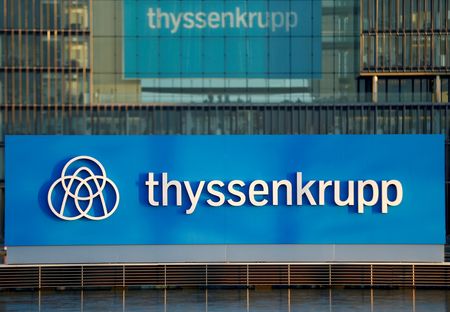By Christoph Steitz and Tom Käckenhoff
FRANKFURT/DUESSELDORF (Reuters) – Thyssenkrupp’s restructuring was progressing at a slow pace, its finance chief said, as the company grapples with delayed spin off and listing of two of its units, as well as negative cash flow, sending its shares down nearly 10%.
“Of course, free cash flow is an issue, and speed of implementation is also an issue,” Klaus Keysberg said on Tuesday after the company’s first-quarter results that showed its adjusted operating profit fell by a third.
“As the investors say, it’s a ‘show me’ story.”
Thyssenkrupp has undergone a major overhaul in recent years by divesting several business, including its elevator unit, but two major pillars of its turnaround, the listing of its hydrogen business and spin off of its steel division, have been repeatedly delayed.
Keysberg refrained to be drawn in on timelines for both the potential transactions.
Shares of the German warship-to-car parts conglomerate fell as much as 9.6% to the bottom of Frankfurt’s midcap index. The stock is down three quarters since January 2018.
“The company’s restructuring is lagging and far too little has happened in the past year,” Ingo Speich of top-20 shareholder Deka Investment said at the group’s annual general meeting earlier this month.
In recent weeks German companies have seen a number of investors demanding spin offs or break ups to raise value, including pharma giant Bayer and chemicals distributor Brenntag.
Keysberg said a potential listing of Nucera, Thyssenkrupp’s hydrogen joint venture with Italy’s De Nora, needed a better market environment while a spin off of the steel unit, first flagged two years ago, required billions of green subsidies.
Thyssenkrupp’s free cash flow (FCF) before M&A, a key gauge of the company’s financial health, improved in the first quarter from a year earlier, but remained negative at 365 million euros ($393 million).
The company, which last had a positive FCF before M&A seven years ago, confirmed it expects the metric to at least break even in its current fiscal year, with Keysberg saying that generating positive cash flow was his highest priority.
Thyssenkrupp’s first-quarter profit was hit by lower metal prices and falling orders, compounded by worries of a looming recession in the United States and the Russia-Ukraine conflict, which have led customers to start emptying their inventories.
“There is limited visibility in respect of future economic developments,” Keysberg said.
Essen-based Thyssenkrupp, in particular pointed to destocking at automotive clients, the company’s single-biggest customer base.
Adjusted earnings before interest and taxes, or EBIT, came in at 254 million euros in the October-December period, while sales remained stable at 9.02 billion euros, the company said.
Thyssenkrupp’s steel business, Europe’s second-largest after ArcelorMittal, was less affected than expected due to long-term contracts that lock-in prices and only reflect declines with a time delay of several quarters.
GRAPHIC: Thyssenkrupp shares plunge (https://fingfx.thomsonreuters.com/gfx/mkt/znpnbkgaxpl/TK.PNG)
($1 = 0.9293 euros)
(Reporting by Christoph Steitz and Tom Kaeckenhoff; Additional reporting by Stefanie Geiger and Josephine Mason; Editing by Sandra Maler, Miranda Murray, Nivedita Bhattacharjee and Shounak Dasgupta)

